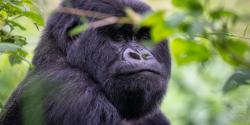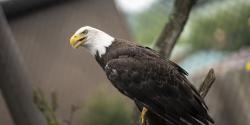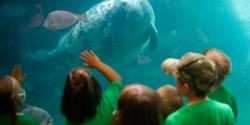Powell, Ohio –Nationally known for its expertise in animal care, and supporting and advocating for the conservation of endangered cat species globally, the Columbus Zoo and Aquarium, under new leadership, supports passage of federal legislation designed to protect animals and the public.
The Big Cat Public Safety Act (H.R.263) would prohibit private ownership of big cats (such as lions, tigers, cheetahs and cougars) as pets and ban cub-petting venues. In December 2020, a similar bill passed the House of Representatives but did not reach the Senate floor before the 116th Congress closed. The latest version of the bill awaits another vote after being reintroduced in the House in January 2021, and this week, it was introduced to the U.S. Senate with bipartisan support. Earlier this month, an article by National Geographic Society’s Wildlife Watch investigative reporting project also made the case for more oversight to ensure the well-being of all big cats from birth to the end of life.
“Our Zoo and The Wilds are deeply committed to the welfare and conservation of big cats. As with any organization, our Zoo’s practices continue to evolve and have been updated throughout our history. During this time, we have gained a lot of information and experience that we have been able to apply to our work in saving many endangered animals here at the Zoo and The Wilds, while also developing an incredible cheetah conservation breeding program at The Wilds,” said Interim CEO and President Jerry Borin. “As an organization dedicated to the animals in our care and the protection of these species’ future, it makes sense that we do all we can, including supporting the Big Cat Public Safety Act, to keep endangered cats safe throughout their lives.”
Borin said the Columbus Zoo and other zoos accredited by the Association of Zoos and Aquariums (AZA) around the country play a significant role in inspiring the public to understand and care about wildlife, including the welfare of big cats.
“We have the responsibility to provide support to help conservation projects in Africa and Asia where big cat populations are in serious decline,” he said. “The Zoo’s programs help raise public awareness of the fragility of many large cat species that are facing extinction.”
Since 1995, the Columbus Zoo has contributed more than $1.33 million to big cat conservation programs, including three cheetah conservation organizations in four range countries: Cheetah Conservation Fund (Namibia and Somaliland) and Action for Cheetahs in Kenya; International Snow Leopard Trust; Wildlife Conservation Society’s Siberian Tiger project; and Ewaso Lion Project to ensure a future for Kenya’s lions through community-based conservation.
###
About the Columbus Zoo and Aquarium
Home to more than 10,000 animals representing over 600 species worldwide, the Columbus Zoo and Aquarium leads and inspires by connecting people and wildlife. The Zoo complex is a recreational and education destination that includes the 22-acre Zoombezi Bay water park and 18-hole Safari Golf Course. The Columbus Zoo and Aquarium also manages The Wilds, a 10,000-acre conservation center and safari park located in southeastern Ohio. The Zoo is a regional attraction with global impact, annually contributing privately raised funds to support conservation projects worldwide. A 501(c)(3) nonprofit organization, the Columbus Zoo has earned Charity Navigator’s prestigious 4-star rating.









